
Frater Ifpas – on Instagram “this_occult_life” in altar robe
I first noticed Frater Ipafs one year ago on Instagram and started following his quite unique feed, which gives rare and open insights into his strict discipline, rigorous studies and practice of ceremonial magick, deeply rooted in the Golden Dawn tradition. We occasionally had a small chat on Instagram and at the beginning of the year, I invited him to an interview on the new to be made Nettle blog. Fortunately, he agreed, as he recently slowed down his activity there, in favor of a new blog project (work in progress – fireandlux.com) …
Alexander: Frater Ipafs, great to have you here! I am glad you took the time to speak with me today about Instagram, ceremonial magick, and especially: You. But I also want to give our conversation today a theme or frame: how to integrate occult practice into everyday life and routines – That would be a very interesting thing.
Let me explain the background and meaning of this question: I was just having a conversation with a friend yesterday, how the Occult scene and people in it have changed over the course of the years, compared to the, let’s say the 70s or 80s. My conclusion was that one the one hand, we have more access to occult information and communities than ever, on the other hand, the time we actually have to practice the craft shrank, due to modern working conditions and frequent interruptions through technology. Then, today, I was reading on WildHunt.org that a large spiritual center was selling its premises and lands – The Light Haven. The reasons stated: changes in economics and lifestyle – people (have) work more and are less available to learn every weekend focused within a community. Maybe they do it more on their own.
“Very few people develop the capacity for actually producing results in ritual – without that discipline, they usually remain ‘armchair occultists’…”
Frater Ipafs: I always enjoy a good theme! I’d be interested in hearing your experiences throughout the 80s and 90s within the world of occultism – I’m disappointed that I wasn’t yet alive to have experienced them to any real measure. I have heard of other centers/chapters/lodges closing due to a lack of resources. There isn’t often a demand for such places these days, and because very few people are sincere in their practice, they aren’t able to develop the capacity for actually producing results in ritual – without that discipline, they usually remain “armchair occultists.” Therefore, they often end their journey before it ever begins.
Many people, particularly of my generation and younger (and specifically in the USA), are barely taught any skills within the realm of citizenship. Civil services aren’t very well-understood, and proposing ideas to a city (such as in a town meeting,etc.) are skills that escape the majority of my peers. Civil disobedience is not taught, therefore all of our protests are almost instantly violent. And it seems to be engineered on a greater scale.
However, back to my point, most young magicians/witches/etc would not know where to begin in locating, contacting, and much less participating with any sort of metaphysical group or community, because they often lack such basic social skills within the context of their society. The popularity of such groups as the OTO abounds online, but they have only a handful of members that actually attend any of their services. You’ll meet many “Thelemites,” but they are almost always never formally initiated.
Alexander: Spot on, regarding the discipline. This is exactly an observation I made quite often. As in any craft, a certain degree of skill requires practice, no matter how much talent birth has endowed you with. That is as true for magick as it is for ballet, martial arts or the road to enlightenment, just to bring our Eastern counterparts into the equation.
Regarding the 80s and before – I was a kid back then, being born in ’78, but I remember the generations before quite well – starting to work in an occult bookstore since the early 90s I was exactly between these generations of occultists which have grown up before and after the digital revolution. Anyways, my main point is that back then many people could live well enough from one job: that for most of them this job ended in the afternoon (and not in the evening) and that with the lack of modern technology people were more likely to have the time and silence it takes to deeply study a book without interruption and to exercise at least an hour or two a day, without being disturbed…
“I’d estimate I spend (consciously) 5 hours of each day devoting myself to the Great Work”
But let’s talk about ourselves, and mainly you. You have a quite rigid discipline and routine and even start at five o’clock in the morning. How much time per day do you devote to the great work?
Frater Ipafs: I’m very glad you mentioned Eastern counterparts — Butoh is one of my largest sources of inspiration in all my personal expressions of creativity. In regard to your question, though, I’d estimate I spend (consciously) 5 hours of each day devoting myself to the Great Work. This includes reading, my creative endeavors, my physical and spiritual conditioning, etc.
Alexander: Five hours is quite a lot for most people. How does a typical day of yours look like and what is your practice?
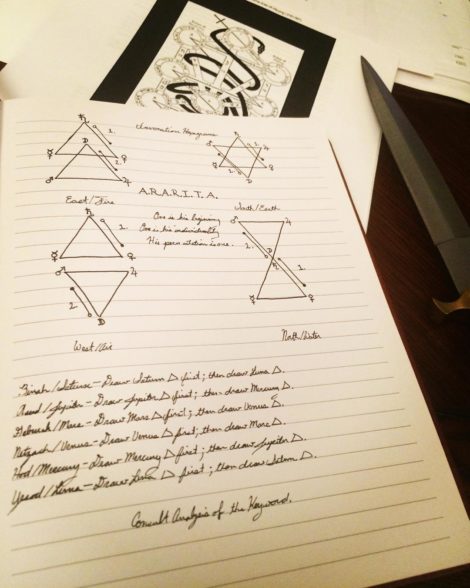
Besides reading, meditation, ritual and yoga journaling is an important part of Frater Ipafs daily routine
Frater Ipafs: Indeed, I suppose it is. I almost never leave my home to socialize; my coworkers from my day job can corroborate that.
Every morning, I am certain to cast the Lesser Banishing Ritual of The Pentagram. This is immediately followed by the Lesser Invoking Ritual of the Hexagram. I perform them in this order for their unique operative purposes (casting them, juxtaposed, in various combinations creates different effects on the “field”). This is followed by Tai Chi and then the Middle Pillar Exercise.
I am sure to offer items to my altars that are of a favorable similitude to whatever Celestial bodies, Sephirothic bodies, angelic, etc that I am currently synchronizing with per the requirements of my present work.
Meditation, by the use of a daily tarot card drawing, is performed to explore the various paths and gateways of the Tree of Life itself. Of course, certain gateways remain closed–it takes exorbitant amounts of time and effort to endure and ultimately transcend any one path. I also complete (at a minimum) 30 minutes of Hatha Yoga; this is followed by pranayama.
I hold myself to reading a minimum of 15 pages per day, but my journal of discipline suggests I average close to 50 lately.
Before bed, I cast The Lesser Banishing Ritual of the Pentagram and the Lesser Banishing Ritual of the Hexagram.
This, currently, seems to be my personal standard of performance. If I am engaged in any specific workings, then those too will be incorporated. Logging my activities in my journal consumes a bit of time too.
Alexander: Yes! The journal ? With this amount of practice I suppose the journaling of relevant experiences, progress, and insights will take another hour…
“Believe me, my arm aches often from the strain on the wrist”
Frater Ipafs: Haha, quite right! Believe me, my arm aches often from the strain on the wrist. I’m also inclined to illustrate my notes upon occasion– this really helps me to catalog the information concretely.
Alexander: How did you find this passion for the occult – or how did the occult find you?
Frater Ipafs: This question is difficult. How does one become a doctor? A teacher? A factory worker? I suppose, initially, we all are seeking some framework to help ourselves. Usually to mollify some stress, need for resources, or what have you. It was no different for me.
As a child, I was often able to see those that had died in a very clear sense. At that age (I think 6 years old), I had no understanding of it. Parents, when faced with this, have a tendency to steamroll over it until the ability is suppressed– usually an indirect result of practiced alienation. In my late teens, I experienced a massive car accident (I can’t remember it to this day) in which I completely lost consciousness for a considerable amount of time. Since “returning” from that experience, my once-suppressed sensitivities returned, and I was a scattered mess. I couldn’t manage them.
At first, I turned to the path of the Healer. I apprenticed and became a Reiki Master; I’m also a certified crystologist teacher under the school of Melody (a renowned crystal healer). I attended unusual seminars to help cultivate my psychic abilities. But what I found mostly were money hungry charlatans and people that made a living on “being a guru.” This was largely disturbing to me.
One of my best friends from childhood (who had run off with a traveling “hippie” community) had returned to my life around the age of 21 or so. I had already been deeply exploring the works of famous chaos magicians, wiccans, various traditions of hoodoo, voudon gnosis, etc. But my friend, as it turns out, had been doing the very same thing. He also happened to have a copy of A Garden of Pomegranates by Israel Regardie. My introduction to that book completely changed the course of my work. Essentially, it was the advent of my real work. As I’ve matured and gained a deeper understanding of the great work, my sense of purpose has matured as well. It is not longer a struggle to rectify some unusual component of myself. Israel Regardie states something in The Tree of Life that is similar to By lifting ourselves through the great work, we also lift our fellow man.
“I have found a sense of purpose within the work itself”
Alexander: This brings me to the benefits of occult work — which are the three main benefits you obtain from your practice?
Frater Ipafs: Three? I’ll do my best to keep it to three haha. One of them, without question, is that I have found a sense of purpose within the work itself. I am passionate about what I’m doing, regardless of whether or not anyone watching understands it entirely. The work isn’t meant to be a prescription for “obtaining purpose,” but it has certainly worked out that way for me. Another benefit is that, through mutual aims/interests, it has connected me with several individuals that appear to appreciate what I’m doing/creating as a result of my efforts. A third benefit is that I have come to trust every step I take toward manifesting my will– I no longer question and second guess myself when it comes to my personal goals and agendas.
“All things lead back to their origins. And so it is that we seek ascension through the Tree of Life, allowing humanity access to higher and higher branches until we are finally able to return to Kether, the source.”
Alexander: How would you define “the great work”? What is it?
Frater Ipafs: I’m thrilled that you’ve asked this. It’s a question that is almost never asked. Many renowned magicians that have written several books on devotional ritual, systems of magick, etc, have no answer for this. With all this work, what are we working towards?
Dion Fortune stated in (I believe) The Mystical Qabalah that The Great Work is the massive undertaking of encouraging mankind to evolve spiritually. Like all things in existence, our evolution is cyclical. Streams eventually curl in on themselves to ultimately return to their origin (which happens to be a circle). The watch/clock is also designed this way, because there really aren’t any true linear paths. All things lead back to their origins. And so it is that we seek ascension through the Tree of Life, allowing humanity access to higher and higher branches until we are finally able to return to Kether, the source.
Fortune also states that The Great Work is responsible for removing accumulated Karmic discrepancies (psychic infection, she calls it at one point) for this very purpose. And I would like to think this is quite true. I suppose no one can validate it, for no being may experience Kether fully and live.
Alexander: Then, it has to remain a secret ?
By the way, Dion Fortune had the magical Motto “Deo, Non Fortuna”. You are in the same tradition of hermetic magicians who call themselves Frater (Brother) or Soror (Sister), followed by a personal Motto or an acronym thereof, usually in Latin. Your magical name is Frater Iipafs or i-pah-fus (very similar to the pronunciation of Icarus). This name, or motto also refers to the great work, I suppose?
Frater Ipafs: Indeed. It translates from the Latin, “In Principio Ad Finem Sum,” to, “In the beginning, I am the end.” This is a direct statement about the return to Kether, the origin. It is a reference to the relationship of the court cards of the tarot as they descend through the four worlds of the Sephiroth as well.
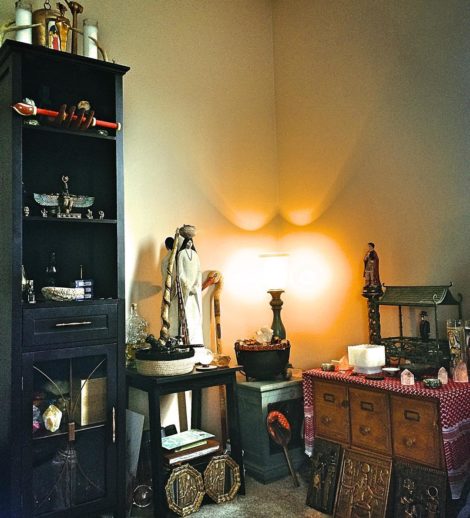
Frater Ipafs’ ritual room with view on the altar – a four-staged shelf representing the four worlds (or levels) of the tree of life
Alexander: I noticed your Altar is also structured in four (five) stages. One for each of the worlds Aatziluth, Briah, Yetzirah, Aassiah and also analog to the four elements… but we are already deep into the cabala here…
Frater Ipafs: That’s a keen observation. It isn’t uncommon for my altars to deviate a bit depending on the specific workings I’m doing, but yes–that is their typical structure. This is due to so much of my work involving the direct invocation of the Spheres of the Sephiroth for spiritual growth. Sometimes, If I’m transparent enough to post them, it can be seen that I’ve switched the order around–this usually suggests I’ve been directly invoking god forms.
Alexander: Regarding your Instagram – Your Instagram account is maybe the most original and illustrative one when it comes to ceremonial magick. How come you started it?
Frater Ipafs: I deeply appreciate that statement. I had avoided most social media for a very long time. For a moment, I’d returned to Facebook, and I’d experienced a few of the “witchy” communities therein. Though I did find one knowledgeable group, almost all of them were shallow, insubstantial, and full of Hollywood references. It certainly wasn’t a place for learning.
I quickly left Facebook; having nothing left to lose, I tried Instagram. I eased in by posting a few images of Low Magick rituals I’d been performing; they were received well enough. I gradually faded in the true meat of my work as time went on. As my connections grew, so did my confidence. I receive many messages regarding ritual practice, techniques, etc, and I’m very happy to have those opportunities to teach and also learn.
“Magicians of the past were enflaming a spiritual/magickal revolution … many practitioners of today seem to be more inclined to … self-image, and … popularity”
Alexander: Which brings us again to our starting topic: How did occultists change over time in regards to the depth of their practice and studies…
Frater Ipafs: Well, I suppose any answer to that question will depend upon the period of time in which we address it. With The Golden Dawn, we had the revival of many lost practices — with that came secrecy and a corrupt system of aristocracy too. Then, Crowley emerges and releases much of the information that was hidden, establishes an entirely new paradigm, etc. However, this example alone shows the difference in magnitude between the magicians of the past and the magicians/witches/etc of today. Whereas these magicians of the past were enflaming a spiritual/magickal revolution and essentially encouraging mankind to evolve, many practitioners of today seem to be more inclined to practice for the sake of convenience, self-image, and a strange sort of popularity. I really can’t say enough about this; even our more popular occult authors don’t seem to be exploring new arenas of the work — they mostly dissect the practices of old, repeating them endlessly, and then publishing further diluted works about their results. Dissection is absolutely necessary in the formula of Solve et Coagula, but analysis must, at some point, take place so that something new is conceived.
Alexander: One thing is new, though. It is the Pottermania: the new generation of witches has read Harry Potter inside out and refers to it all the time. I am in some witch chat on a messenger app, and Potter comparisons are one of the most frequent encounters each day. It is not bad though – it gives the community common reference points…
Frater Ipafs: As far as Harry Potter goes, this doesn’t bother me either. I feel that series does have integrity, and it often makes interesting, legitimate references to occult figures. Besides, who can resist a story built around the Dying God formula? Personally, I’m a fan.
Alexander: Rowling definitely has a more than solid occult education. I like the universe she created and their stories became a reference point for many conversations on many levels. If she intended that – I have no idea.
Frater Ipafs: I’d say Rowling probably has more up her sleeve than we’ll ever know.
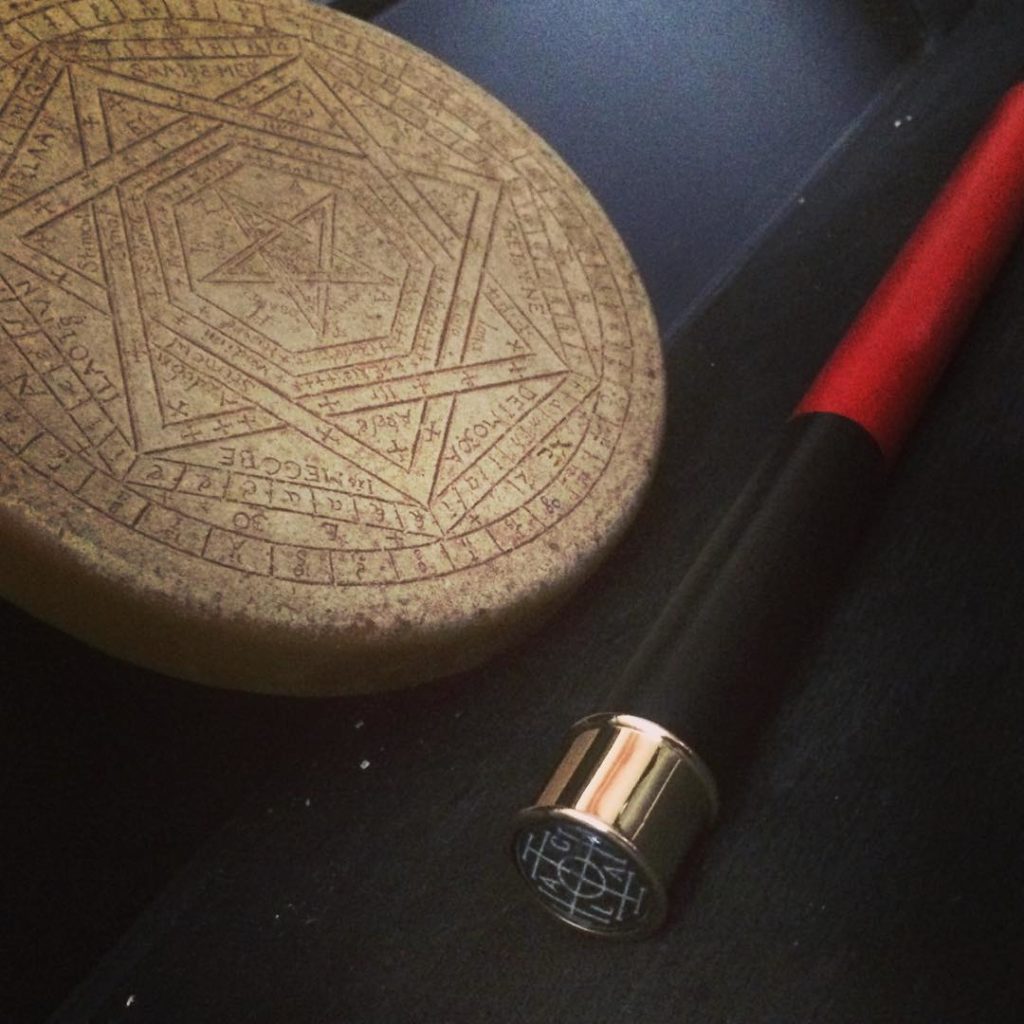
Enochian wand and Sigillum Dei Aemeth carved in beeswax – the sigillum is handcrafted by Frater Ipafs, the wand handcrafted by Tabitha and Chic Cicero – two of Israel Regardie’s direct students
Alexander: Anyways, Harry Potter reminds me of your interest in magic wands and the high level of skill you seem to have in crafting a lot of your own accessories and ritual supplies – such as the Sigillum Dei Aemeth you made.
Frater Ipafs: Ah, thank you again. Honestly, that Sigillum took 30+ hours to create. Besides the baking of it, carving each tiny character into with a sewing needle nearly drove me mad. My home smelled of beeswax for at least a week.
Alexander: How do you decide whether you make a tool yourself or purchase it?
Frater Ipafs: Usually, it becomes a matter of finances. If I can afford the tools that I need to make the magickal tool, I’ll almost always make it myself. For instance, a metal engraver isn’t terribly pricey, nor is beeswax, paint, glass engraver, or whatever else is small and practical. However, when it comes to making tools that require very competent wood-working, I usually have to surrender my creative freedom. For my traditional Golden Dawn implements (such as the Keryx wand, the Water Cup, and the Fire Wand), I contact Tabitha and Chic Cicero, the last two practitioners to be trained personally by Israel Regardie. They have an online store in which they offer customized tools. They do beautiful work– they even send a certificate of authenticity.
Alexander: And how do you handle your new purchases before letting them into your altar room?
Frater Ipafs: The consecration ritual must be performed before they are to enter– the Keryx wand is designed specifically for this purpose.
Alexander: Here I want to ask a laymen question, maybe also for all those, who do not practice ceremonial magic, but still want to do some cleansing. As an expert in crystals – would you recommend for example Amethyst to clean such a new purchase or item of any kind from foreign / unwanted energies and influences?
Frater Ipafs: If one is familiar enough to utilize crystals in such a way, of course! Interesting you should bring up Amethyst — I was reading a bit of Agrippa’s works earlier, and he was talking about their use as far as removing drunkenness goes. He also stated that drunkenness can be remedied by washing one’s genitals with vinegar. Not entirely relevant, but I thought it worth sharing.
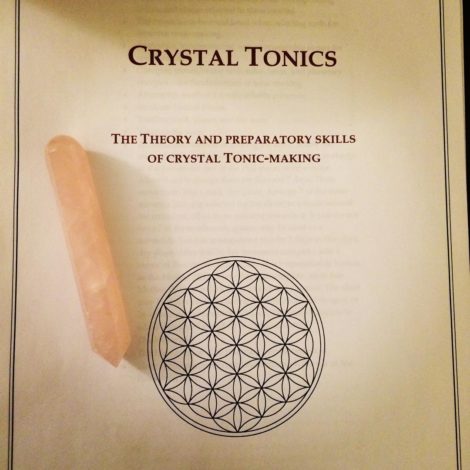
Crystal Tonics – Manual for a course taught by Frater Ipafs
Alexander: It is a good advice for the next time someone very drunk wants to get sober very fast ?
As for the crystals: there is another reason I asked – you offered a course on crystal tonics. Do you still offer it? Can it be attended?
Frater Ipafs: Ah, yes! That feels like ages ago that I was “advertising” for that. Unfortunately, the metaphysical center from which I used to teach has closed. I still have the curriculum I created. It was compiled from my own results gained from utilizing the techniques therein. I’d really like to teach it again someday. It made use of the planetary squares from Francis Barrett’s The Magus to create specific sigils which were then used to charge the tonics (already infused with relevant crystals). Perhaps it could be one day adapted to an online format? For now, I’m working on a few other projects.
Alexander: That would be definitely be something where NettlesGarden.com would like to get in. Even in publishing it — printed. Let’s look into that. But, what is the basic idea of a crystal tonic anyways?
Frater Ipafs: I like the idea of that. The idea is derived from the thought that the crystals might more potently affect our physical/energetic bodies if they are directly ingested. This does entail some danger–not all crystals are safe. Several are radioactive/toxic, etc. But the material covers the techniques involved in charging safe crystals for specific augmentations or effects that decrease unwanted attributes. These encompass the use of solar patterns as well as lunar cycles for nuanced applications.
The material also teaches the basic skill of diagnosing someone’s needs based on their health or circumstances. The advanced work then involves gaining an understanding of the planetary squares (from which sigils are created). The planets each have unique properties, and through the use of the sigils, we can augment the tonic’s potency with their specific property. We then learn the planetary days/hours for maximum potency of the tonic.
Alexander: Could you give us a simple example of such a tonic? How to and why make it?
Frater Ipafs: Of course. Let us assume that I am suffering from a fear of confrontation. I am constantly pressured into making disadvantageous decisions at work that will benefit only other people. Therefore, I’m likely having imbalances in my throat chakra (primarily–I could be suffering in other centers as well, but we’ll keep it simple). This being the case, I would choose a blue stone (particularly one that assists with communication such as Blue Kyanite).
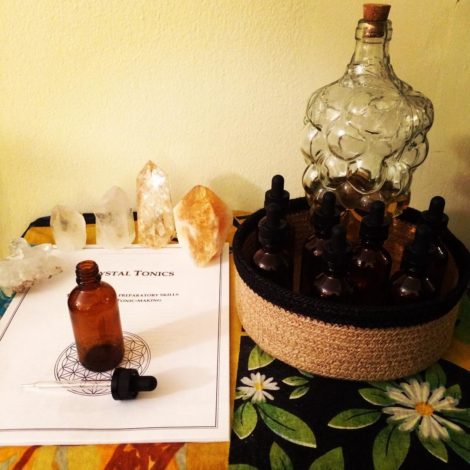
Crystal tonics: crystals, supplies and accessories needed for preparation
This would be safely placed in a glass vessel of water (I’ll omit the methods for preparing delicate stones such as Kyanite). Because it is a matter of needing some form of augmentation, we’d likely choose to charge the vessel during a Full Moon. We’d try to obtain as much exposure as possible, simply letting the vessel sit in the yard and charge during the night.
Going further, we could create a statement of intent. “I am confident and express my feelings honestly and fearlessly.” From this, we’d could find the numerological value of the statement and use those values as coordinates upon a planetary square. We’d then create a sigil from those points.
This would create a talisman (of whatever relevant planet we chose) that we could further augment our tonic. After all is said and done, we could then massage a few drops of the tonic onto the targeted chakra or ingest it directly. It is, at its most elementary, sympathetic magick.
Alexander: That is a beautiful system. It should work similar with other materials, specifically herbs?
Frater Ipafs: Absolutely. So long as those herbs are agreeable with the chosen celestial bodies.
Alexander: There is another thing I wanted to ask you, but for this, I need to switch topics. You also created one guided meditation – it is your voice, a very pleasant one! Did you also do the editing?
Frater Ipafs: I’d nearly forgotten until I stumbled upon it myself the other day. Yes, that is my voice– thank you! I used to volunteer for a voice acting community that would record free audio books for the blind. I did the editing as well. Unfortunately, I didn’t take the time needed to produce a result I was pleased with haha.
Alexander: I was quite impressed with it, but let me make an observation before asking further about the guided meditation: You seem to be a lot into charitable work. Volunteering, an important part of the great work for you is defined by helping mankind evolve — it is something you mentioned before any personal or individual benefit. Is the concept of serving important for you?
Frater Ipafs: When I really analyze the thought of serving in this context, serving seems to be the incorrect term. I suppose that my aims are slightly self-indulgent in the sense that I hope to shape a paradigm that allows for more acceptance, more harmony, but also more exploration, because that is a world I would personally desire. I would like to see the evolution of mankind personally, but I do not believe I’ll truly see the results in my life, for they are probably too expansive and subtle to perceive effectively. I’m sure Crowley never understood the depth of his impact, whether we consider it positive or negative, on the perception of sexual liberation and spirituality. Though, I’m not so bold as to compare myself to the likes of Crowley or any of the greats for that matter.
Fun fact – What is your stance on Aleister Crowley?
This is not a question I often receive. Most seem to assume I’m a Thelemite and probably also assume I have the greatest endearment for him. Truthfully, I absolutely respect his contributions. Do I respect his methods for reaching such achievements? Not all of them, no. It is difficult to approach the question in a satisfactory way, because I obviously never had the chance to know the man. He seems, from his writings, sincere, clever, funny, and erudite.
There is an introduction in the 5th edition of Regardie’s The Golden Dawn in which Regardie is discussing the criticism he received via mail for his having revealed secret information kept exclusively within the order. One such letter came from Crowley himself (Regardie, in his younger years, was an assistant of some nature to Crowley). Crowley berated him, as did the others, for his offenses against the order, but Regardie was entertained by the raw irony of this, for Crowley, in his Equinox series, had done the very same thing years before. Regardie states that he feels Crowley might have been sour over the fact that his The Golden Dawn was far better edited than the Equinox series. I feel Crowley probably wrote such a preposterous letter for the irony itself.
Besides his obvious contributions, I feel something went terribly wrong for Crowley along the way; no matter what I read and learn about him, I can’t shake the feeling that there was some discrepancy in his approach to the Adeptus Minor grade, the sphere of Tiphareth. Again, I can only assume. It is interesting to note that Crowley had embellished the Lesser Bannishing Pentagram Ritural with his Aiwass addition, but, towards the end of his life, was reported to have abandoned the embellishment and was once again using the format from The Golden Dawn.
Alexander: I see. I just made that insertion, because one of the slogans important to the SOL (a magic school founded by W.E. Butler, who in turn was trained in the order of Dion Fortune) was something like “I wish to know to be able to serve” – I am not quite sure about the wording, as I read the relevant books in German, more than 25 years ago. But it reminded me of that.
Frater Ipafs: In that sense, I understand. Yes, I would say surrender is intrinsically connected to The Great Work. The Christ Formula champions it, the relationships of Mambos and the Lowa as well– even the return to Kether is ultimately the greatest surrender. I definitely see your point.
Alexander: Maybe it’s a constant in occultism and Witchcraft anyways. Most occultists and witches were healers and served the community at some point. Agrippa even refused to leave the city during an epidemic as he considered his healing service more important.
Frater Ipafs: An excellent point! The metaphysical paths, when sincerely practiced, are most often a humanitarian endeavor at their root.
Alexander: Which brings me back to your guided meditation – which seems also quite helpful. The meditation aims to free from negative influences – the listener separates and bundles negative or disturbing influences within an object which is to be buried until her mirror image clears. – What is the idea behind it?
Frater Ipafs: The Guided meditation, I think, was made for the purpose of removing those landmarks of self-loathing from ourselves, to be free to turn a new page in our lives. At the time I created it, I was suffering from seizure activity induced by panic attacks. They began happening abruptly one day– they’ve since gone. But, usually, when we feel crippled, it is because we are crippling ourselves.
Alexander: So it is about letting go and rest in peace. Mainly when we are not feeling well in our skin?
Frater Ipafs: Absolutely. It could generalize to just about anything: letting go of people, jobs, memories, deceased ones, etc.
“What good is talent if it is easily perverted by gluttony or sloth? It must be focused to be of any use”
Alexander: For today we have about five minutes left – Unfortunately, but it already well over 2 am here in Moscow. But I’d be delighted to continue another day ?
Anyways, after all that insights I realize again, that introducing you seems to me like being in danger of omitting something important. I mean, you are into ceremonial magic, the cabala, Enochian magic, but still well acquainted with Wicca and Voodoo. You practice tarot, prepare and teach crystal tonics, you draw and paint in oil, and show quite some talent in crafting your own tools and accessories for your altar room. Let’s get bluntly back to our first topic: Talent or discipline? Which one wins?
Frater Ipafs: You’re too generous to me, really. Thank you for all of your kind words! Of those two variables, the answer seems obvious to me: Discipline. What good is talent if it is easily perverted by gluttony or sloth? It must be focused to be of any use.
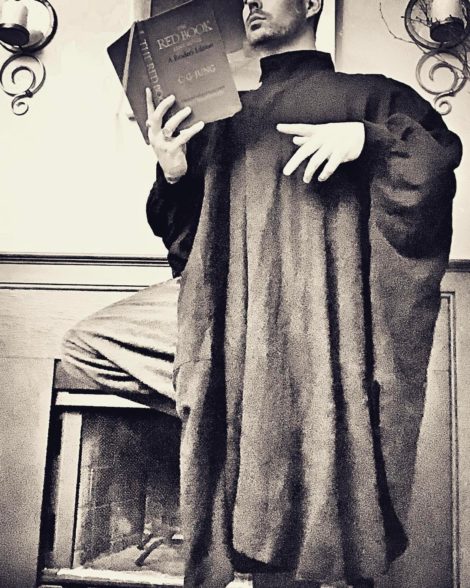
Would you believe … I stood in tree pose with a glass of water on my head while holding a book before me?
Alexander: My last question for today: Who took the photos of you, especially in the ritual poses?
Frater Ipafs: I’m smiling as I type this. I can’t help but laugh– I have taken every photo I’ve posted.
Would you believe that I set up the camera, initiated the timer function, ran across the room, stood in tree pose with a glass of water on my head while holding a book before me? It’s true.
Though, unfortunately, the glass was cut out of the picture. But even that, I feel, is a testament to willpower and discipline, albeit a frivolous one.
Alexander: That is awesome, I guess that would have been worth filming )))
Frater Ipafs: I’m so glad it wasn’t. No one deserves to see me shambling about in a robe haha.

Frater Ipafs performing the Lesser Banishing Pentagram Ritual of the Golden Dawn: Beginning pose – Vibration of “AThH”
Alexander: The results are impressive – such as the portrait with a ritual dagger while performing the lesser banishing pentagram ritual. It would be nice to continue our conversation soon about further topics 🙂
Frater Ipafs: Thank you again. It’s been an absolute pleasure. And I would be delighted. 🙂
Alexander: Bonus question – Are there any books or other works you want to share with us and why?
Frater Ipafs:I’d highly recommend a book called the Geosophia. It is an incredible piece on the chthonic roots of ceremonial magick, tracing its origins to the Greeks and then following its evolution to the grimoiric format of the medieval age. For those magicians studying the art of evocation, I’d highly encourage this book. Another would be Through Gateways of Stone and Cirlce by Ashen Chassad– its an excellent elaboration on the works of Trithemius (apocryphally published later by Francis Barrett in The Magus).

www.Nettlesgarden.com – The Old Craft



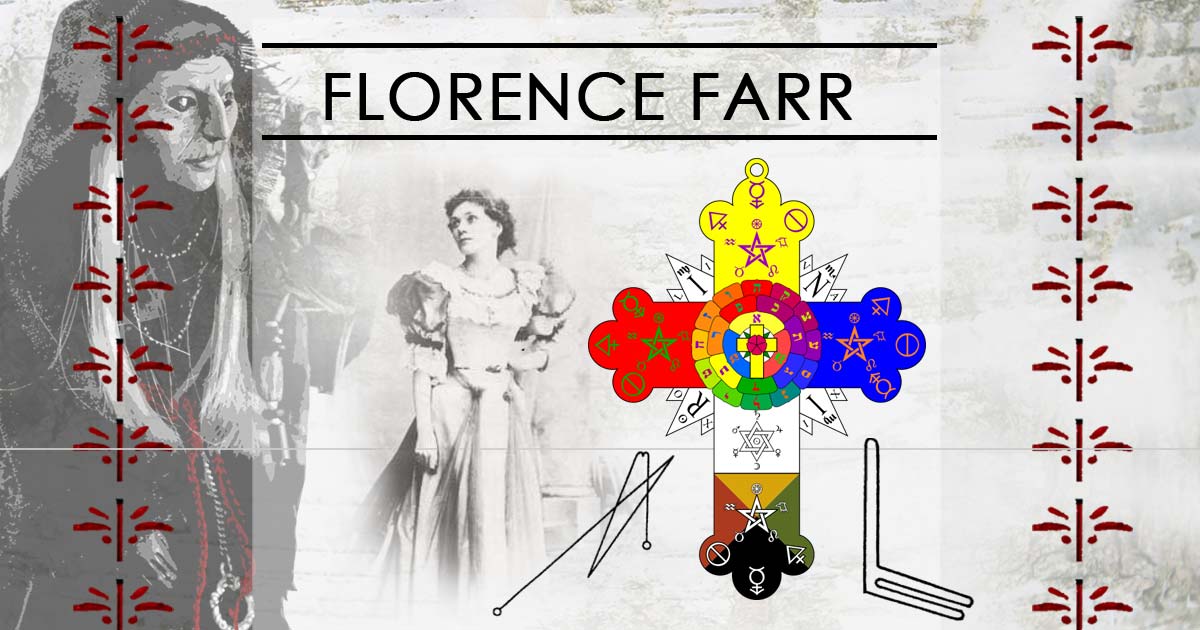

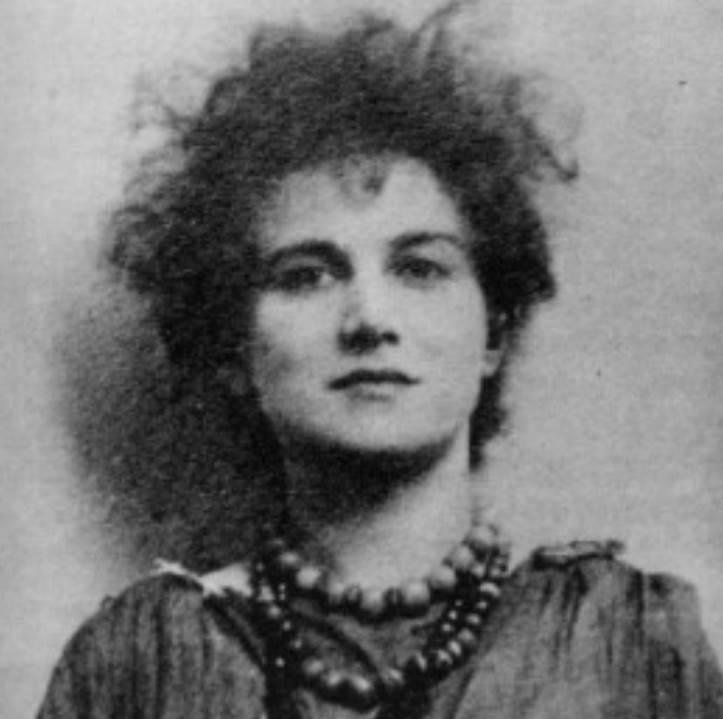
Mark A. O'Blazney | February 22, 2018
|
What an absolutely engaging dharma ! Would enjoy this at each equinox. What say you? Thank you. Thank you. May you be so Blessed !
p.s.- would be pleasing to view Frater Ipafs’ notebook pages. the one you offer here shows neatness and care +